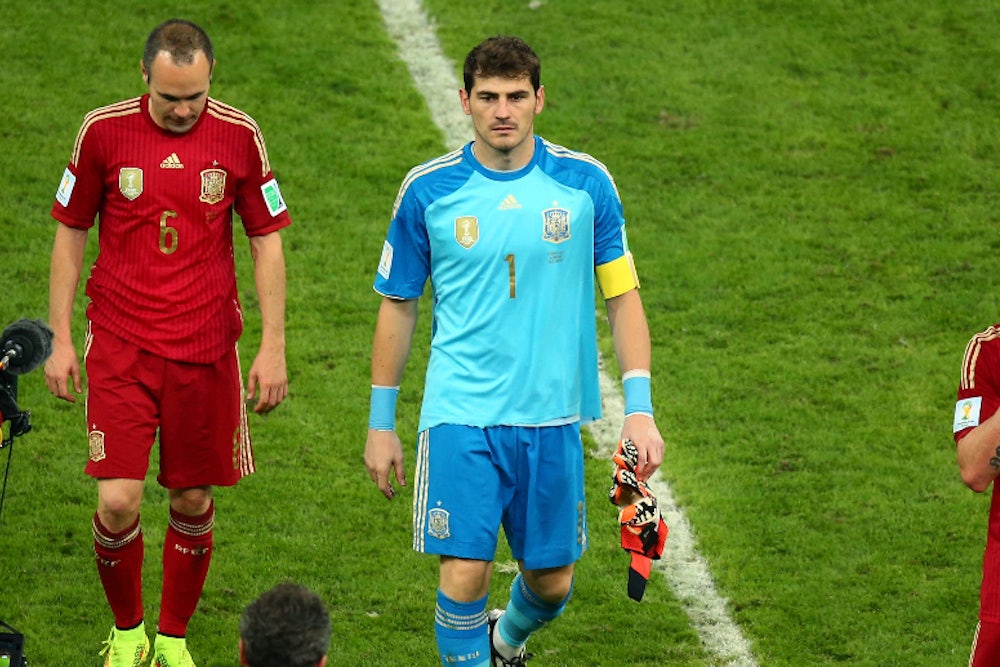Death comes in a Brazilian afternoon and an era ends. But only jerks can really celebrate the death of this great Spanish team. They have given us so much pleasure these past six years that their demise is something to be mourned more than it is celebrated.
It turns out that there are plenty of jerks out there. I dare say their fathers hated Cruyff too.
Tiki-taka, some people say, was boring. Pass-pass-pass-pass, blah-blah-blah-blah. I always thought it mesmerising even as I could acknowledge that football would be diminished if every side tried to play the Spanish way. The game needs contrast to achieve its ultimate ambitions. If everyone agreed on the best way to play we'd all be worse off. We need, even crave, violent disagreement over how we might reach the ultimate; we must agree on ends but differ on means. If we don't then the game loses something vital.
Spain are going home and this is, obviously, a surprise. We all knew that the Netherlands and Chile would test the reigning champions; few of us thought they would fail it so comprehensively. Or so quickly. But age catches up with everyone. Tiki-taka hasn't been killed by tactics or a new approach so much as it has been overwhelmed by age.
We sometimes too easily forget that tiki-taka's principles apply on both sides of the ball. That is, what you do when you do not have the ball matters just as much as what you do when you do have it. A possession-based approach to the game requires you to earn possession in the first place.
Take Xavi, for instance. On Twitter today there were plenty of people slating Vicente del Bosque's decision to leave the great man on the bench. Fair enough, even if much of that criticism was a splendid example of hindsight bias. But can Xavi still muster the energy required to press in the style tiki-take demands? The answer to that question is not obvious.
And not just Xavi either. Spain, like Barcelona, at their best mugged the opposition on those rare occasions the opposition had control of the ball. In these last two matches, however, they have been more like shepherds than muggers. They have shadowed their opponents more than they have swarmed around them. Tiki-taka was always a high-energy business. The tempo might vary when you had the ball but it always had to be high when you didn't.
For six years Spain were the best pick-pockets and muggers in the game. But all good things come to an end and they have twice been mugged in Brazil. Now they are going home. Like all footballing philosophies tiki-taka is only as strong as the players you have who can understand it. Diego Costa is not one of those players.
It would be silly to blame Spain's shortcomings on Costa alone so I will not do so. Nevertheless he represents the difficulty inherent in introducing new players into a successful system and expecting them to learn the grammar of that system immediately. Cemeteries are full of once-leading businesses that failed to adapt to changes in times or personnel and football is no different. Poor Xabi Alonso was a miserable shadow of his former self today.
Times change and move on. Credit to Chile for their enterprise today and for their ability to discombobulate the Spaniards. And yet even as we salute their conquerors we should spare a thought or two for the vanquished.
Tiki-taka is less a universally applicable system than a system that was applied with spectacular success by a specific group of players. Eras end and when they do romantics will always feel a pang of wistfulness. This is as it should be. It is natural for an old lion to be supplanted by younger, keener rivals and we may recognise this even as we mourn his obsolescence. Spain today was that old lion. Still noble but not the beast he once had been.
We saw this Spanish team die today and it was both magnificent and terrible to watch. But it was less the death of a footballing philosophy than a reminder that a philosophy is only as good as the players charged with making it flesh.
So long, Spain, but thank you for the memories.
